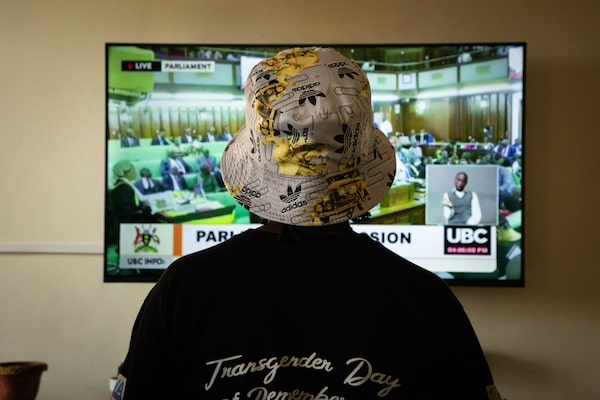
A Ugandan transgender woman who was recently attacked and currently being sheltered watches a TV screen showing the live broadcast of the session from the Parliament for the anti-gay bill, at a local charity supporting the LGBTQ Community near Kampala on March 21. Under the proposed law, anyone in the conservative East African nation who engages in same-sex activity or who identifies publicly as LGBTQ could face up to 10 years in prison.STUART TIBAWESWA/AFP/Getty Images
A harsh new Ugandan anti-gay law, whose provisions include the death penalty in some circumstances, will turn the country’s entire LGBTQ community into fugitives in fear for their lives, activists say.
The law, approved by an almost unanimous vote by cheering MPs in the Ugandan parliament this week, is part of a larger “culture war” promoted by U.S. evangelical Christians and Russian diplomats in Africa, the activists say.
The law, officially called the Anti-Homosexuality Act, is believed to be the most severe ever introduced in an African country. It would impose the death penalty for “aggravated homosexuality” – including “repeated offences.” And in an unprecedented move, it would even criminalize anyone who simply identifies themselves as gay.
The law is still subject to approval by Ugandan President Yoweri Museveni, who has declined to sign such laws in the past. But some analysts believe there is a significant chance that Mr. Museveni will approve the new law in the current climate of worsening homophobia. He has already made a series of verbal attacks on homosexual people in recent days, calling them “deviants.”
International leaders and human-rights groups are alarmed by the new Ugandan law. Prime Minister Justin Trudeau, in a tweet on Wednesday, called it “appalling and abhorrent” and urged Ugandan MPs to reconsider it. “No one, nowhere, should have to live in fear because of who they are or whom they love,” he said.
U.S. Secretary of State Antony Blinken said the law “would undermine fundamental human rights of all Ugandans and could reverse gains in the fight against HIV/AIDS.”
United Nations human-rights commissioner Volker Turk said the law was deeply disturbing and “probably among the worst of its kind in the world.” Amnesty International said the law amounts to “a grave assault” on LGBTQ people and would violate Uganda’s constitution.
“This deeply repressive legislation will institutionalize discrimination, hatred and prejudice” against anyone perceived as gay and would block the legitimate work of civil society and health professionals, Amnesty International’s regional director Tigere Chagutah said in a statement.
Among those targeted for heavy prison sentences in the new law are landlords who rent homes to LGBTQ people, journalists who interview them, organizations that provide any support to them, and anyone who “promotes” homosexuality in any vaguely defined way – even by mentioning their own orientation. Prison sentences for the “promotion” of homosexuality can be up to 20 years, according to the new law.
Some Ugandan journalists are already facing public threats for interviewing LGBTQ people. Some landlords, meanwhile, have begun evicting their tenants. “People are going to become homeless,” said Frank Mugisha, an LGBTQ activist in Uganda whose organization was ordered closed by the government last year.
The law is so broadly defined that it would jeopardize free speech and force health workers to become snitches, Mr. Mugisha told The Globe and Mail in an interview.
“My Twitter and Facebook accounts would be illegal. My work on the human rights of LGBTQ people would be illegal. Doctors would have to report their patients, Catholic priests would have to report people who confess to them, and health-seeking behaviour by LGBTQ people would have to stop.”
Kimahli Powell, chief executive of Rainbow Railroad, a Canadian-based charity that helps LGBTQ people escape from violence or persecution in their home countries, said the Ugandan law is causing a noticeable increase in people seeking help. “We’ve already seen an increase in requests for assistance from Uganda,” he told The Globe on Wednesday.
Ivan Kakonge, deputy executive director of Royal Rays Initiative, another LGBTQ group in Uganda, said the law represents a terrifying shift to a harsher society in which sexual minorities are targeted for violence by police and street mobs.
“This bill makes us fugitives in our country for just being who we are,” he told The Globe.
“Uganda is increasingly unlivable for the LGBTQ community. In the last few months, many queer people have been attacked by mobs, driven out of their homes, denied access to health services and denied entry to public spaces. It is not safe for us anywhere.”
Last month alone, according to rights advocates, more than 110 LGBTQ people in Uganda reported that they had been the victims of incidents that ranged from arrests and evictions to sexual violence.
More than 30 African countries already have laws banning same-sex relationships. But the Ugandan law seems to be part of a new surge of discrimination, fuelled by hate speech in social media and politics, with new criminal penalties now being proposed in countries such as Kenya and Ghana.
Mr. Mugisha said the laws seem to be promoted by U.S. fundamentalist Christian organizations and pro-Russian groups in Africa. The Russian embassy in Kenya, for example, has repeatedly praised Kenyan politicians who attack gay rights. On social media, Russian diplomats in Kenya have alleged that LGBTQ rights are part of a Western campaign to undermine traditional values.
“It’s worrying and troubling that we’re seeing this global cultural war affecting the lives of ordinary Ugandans,” Mr. Mugisha said.
“People will flee the country or be arrested or killed. This bill is asking Ugandans to kill all homosexuals that they see.”
 Geoffrey York
Geoffrey York